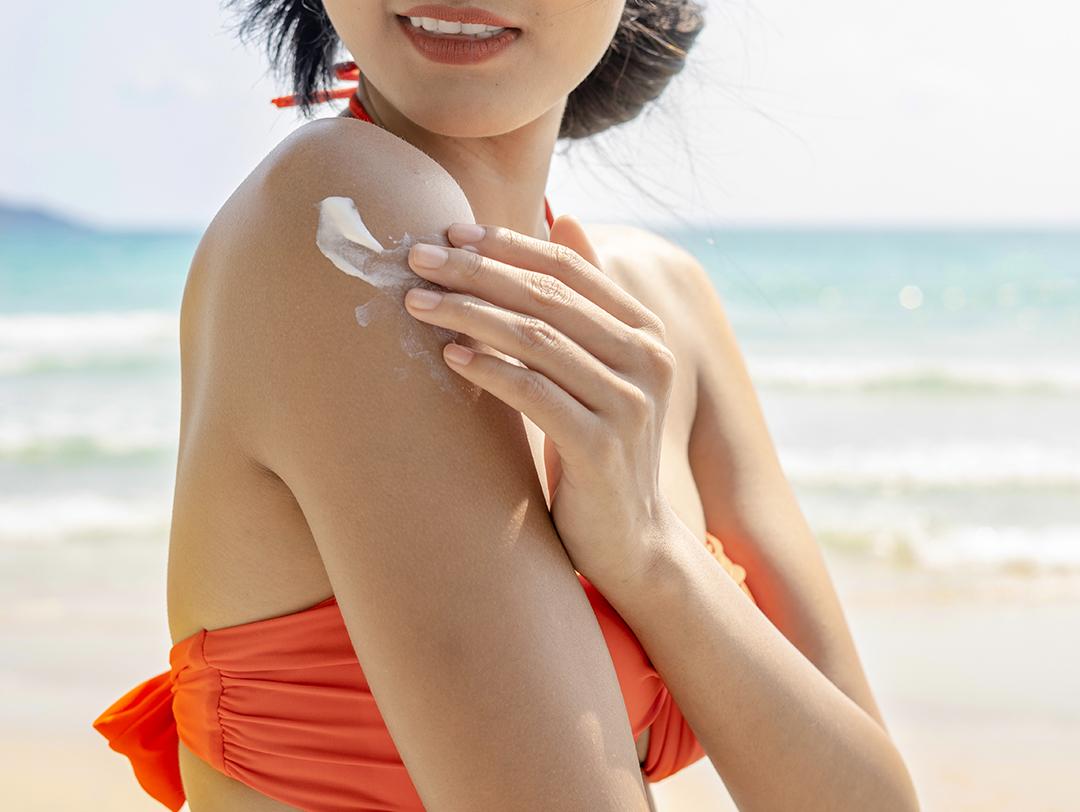Is That Old Bottle of Sunscreen Still Good? Here’s How You Can Tell



Runa Bhattacharya


We've all been there on that first warm, sunny day of the year, digging up a bottle of sunscreen from last summer and hoping for the best. Sometimes your old SPF works fine, but sometimes you end up with a splotchy sunburn. And while we know that applying sunscreen is non-negotiable (80 percent of harmful ultraviolet rays reach us even on a cloudy day, according to The Skin Cancer Foundation), the harsh truth is that unfortunately, sunscreen formulas don't last forever. Sunscreens actually have a relatively short shelf life (yup, we’re talking about that SPF that’s been hanging out in your vanity since the Brangelina breakup of 2016).
But how do you really know when your sunscreen expires, and if it’s safe to use? Is the expiration date on your sunscreen the final word? To answer all your sunscreen questions, we've tapped three dermatologists, Anthony Rossi Jr., MD; Julia Tzu, MD; and Orit Markowitz, MD, for their expert advice. Read on to learn more about this key skincare product's shelf life and how to best prevent sun damage.


It's about glam time you treated yourself.
MEET THE EXPERT
Anthony Rossi Jr., MD, is a board-certified dermatologist and founder of Dr. Rossi Derm MD. He is recognized internationally as a leading expert on sensitive skin.
Julia Tzu, MD, is the founder and Medical Director of Wall Street Dermatology in New York City.
Orit Markowitz, MD, is a board-certified dermatologist, skin cancer expert, and founder of OptiSkin in New York City.
Does Sunscreen Really Expire?
They sure do. “Sunscreens have expiration dates because the active ingredients in them (either the mineral or chemical sunscreen ingredient) have an expiration date after which the efficacy of UV blocking cannot be guaranteed,” explains Dr. Rossi. Exactly how long your sunscreen will last can vary from formula to formula. "The shelf life is usually about one year, but it is important to always check the expiration date on the bottle itself,” explains Dr. Tzu. If you can't find an expiration date on the bottle, it's safe to assume that it'll be good for about three years. According to FDA (Food and Drug Administration) regulations, sunscreen without an expiration date has to be stability tested to last for this amount of time.
Does How I Store My SPF Matter?
Definitely. The way you store your sunscreen could affect its longevity as well, adds Dr. Markowitz. “Like any medication or food, when kept in cool, dark areas, they will last longer—i.e. in the fridge,” she explains. “If you keep your sunscreens in a summer home where it is bright and warm, they may last even less than the expiration date.” Hot, humid temperatures can also affect the integrity of the ingredients in your SPF (i.e. leaving your SPF baking out in the sun when you're on vacation). “Too high temperatures can denature the sunscreen’s active ingredient. Also as it is a compound, if it ‘sits’ around too long the ingredients can come out of the solution, so make sure to mix your sunscreen thoroughly before applying,” Dr. Rossi adds.
So Can I Still Use Expired Sunscreen, or…?
Over time, the active ingredients in sunscreen break down and eventually become less protective against sun exposure. “Anything that is expired will be less effective,” explains Dr. Markowitz. While it may still have some SPF power, you can't be certain of just how much. Depending on how degraded the formula is, your bottle of SPF 50 could be more like SPF 30 or SPF 10. Additionally, expired water-resistant formulas are likely to wash off easier than they typically would, meaning you'll have to reapply more often.
Aside from providing a questionable SPF number, expired sunscreen ingredients can even begin to grow mold or bacteria. This can lead to skin irritation and potentially even skin infections. Obviously, for this reason, expired formulas are particularly risky for sensitive skin types. As a rule, make sure your hands are clean before reaching for your sunscreen to avoid the growth of bacteria and germs.
How Can I Tell If My Sunscreen Has Expired?
Depending on the formula, the changes may be more obvious, but sometimes—especially with chemical sunscreens—you may not be able to tell right away. An obvious way to tell is texture or, “If the lotion or cream has become condensed or even if it seems too liquidy,” Dr. Rossi says. “If the sunscreen changes its physical characteristics, such as texture or color (i.e. white to yellow or brown), it is a good idea to throw it out even if it is within the expiration date,” Dr. Tzu tells us. Look out for changes in smell or the way it feels when you apply it, too. “If you put on sunscreen and it is irritating your skin, that is a sign you should no longer use it,” says Dr. Markowitz.
Does SPF Expire If I Don’t Open It?
“They all have expiration dates regardless of whether they are opened or unopened,” says Dr. Rossi. Bottom line: If it’s past its expiration date, regardless of the date of purchase it's time to replace it. Though the FDA states that unopened sunscreen must be formulated to maintain stability for up to three years, outside factors like where and how your SPF is stored can still cause it to expire faster than that. It’s also important to note that different types of sunscreens may have shorter or longer shelf lives. While organic can vary in meaning across different brands, Dr. Rossi adds that “there are some brands that use more ‘natural’ plant-based preservatives that may have a shorter expiration time.”
How Long Can I Keep My Sunscreen?
That depends on a few factors. If your sunscreen bottle is stored properly, well within its expiration date, and hasn’t changed its consistency or the way it looks and smells, you should be able to use it safely and effectively until it expires. In a nutshell, here are some ways to know that it's time to toss our sunscreen early.
• A change in texture such as graininess, wateriness, separation of the emulsion, and difficulty spreading it onto your skin.
• A change in odor that smells different than when you first opened it (which can also mean that bacteria is growing in your SPF)—and we definitely don’t want that.
• It’s been exposed to extreme temperatures or direct sunlight which can affect its ability to protect your skin from UVA rays and UVB rays.
• It’s been exposed to moisture and humidity (don’t store it in your bathroom).
• It makes your skin breakout (which can be a major sign that bacteria are trapped inside).
Want to ensure that your sunscreen survives your next day in the sun? An FDA-approved tip says, “Protect the sunscreen by wrapping the containers in towels or keeping them in the shade.” Or just pop yours in your drink cooler to keep it chill with your spritzers.
Want more safe skincare tips from the pros? Take our Beauty Quiz now to get started. Already an Ipster? Refer your friends to earn points, which you can use toward products. Either way, don’t forget to check us out on Instagram and Twitter @IPSY.
Like this article? Share it with your friends by clicking the icons below!
Liked this post? Share!
Related Stories


Skin
How to Adjust Your Skincare Routine for Mature Skin in the Winter
Published on Dec 4, 2025 • 7 min read


Skin
Meet the Best Moisturizers for Winter, According to Dermatologists
Published on Dec 1, 2025 • 9 min read


Skin
What Is Inflammaging—and Why Everyone’s Talking About It
Published on Dec 1, 2025 • 8 min read


Skin
6 Skincare Trends to Have on Your Radar in 2026, According to Experts
Published on Dec 1, 2025 • 7 min read


Skin
We Grabbed Our Crystal Ball and Found These 6 Skincare Predictions for 2025
Published on Dec 10, 2024 • 7 min read


Skin
Simple Self-Care Tips That Actually Make a Difference
Published on Nov 13, 2025 • 12 min read


Skin
These 9 Face Scrubs Will Unlock Soft and Smooth Skin on Contact
Published on Nov 5, 2025 • 10 min read


Skin
10 Thanksgiving Foods That Will Have Your Skin Coming Back for Seconds
Published on Oct 15, 2025 • 7 min read


Beauty Picked Just for You
Get 5 products worth up to $70
Plus exclusive access to epic deals up to 80% off
Starting at just $14/month. Cancel anytime.